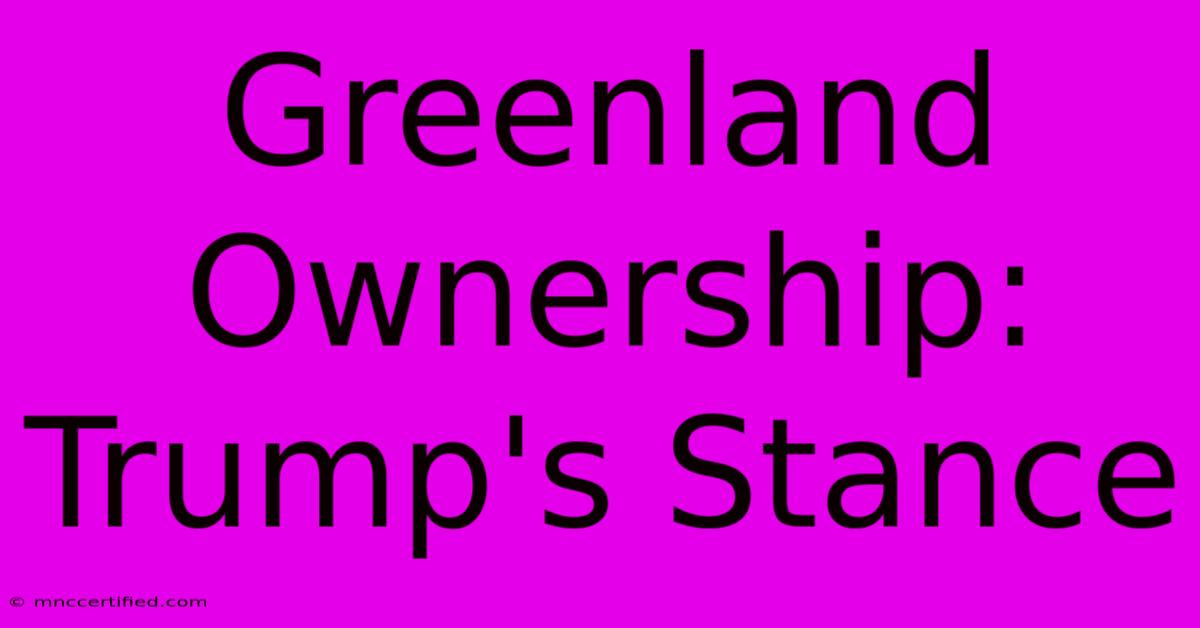Greenland Ownership: Trump's Stance

Table of Contents
Greenland Ownership: Unpacking Trump's Controversial Stance
Donald Trump's 2019 suggestion to purchase Greenland sparked a firestorm of international debate. This article delves into the complexities surrounding Greenland's ownership, exploring the historical context, legal realities, and the implications of Trump's controversial proposal. We'll analyze the reactions from Greenland, Denmark, and the international community, ultimately aiming to provide a comprehensive understanding of this significant geopolitical event.
Greenland: A Land of History and Independence
Greenland, the world's largest island, boasts a rich history and a unique political status. For centuries, it was a Danish colony, but in 1979, it gained home rule, achieving significant self-governance within the Kingdom of Denmark. This means Greenland manages its internal affairs, but Denmark retains responsibility for foreign policy and defense. Crucially, Greenland is not an independent nation. This fundamental fact forms the bedrock of understanding Trump's proposal.
The Legal Framework: Sovereignty and Self-Determination
The question of Greenland's ownership isn't simply a matter of land possession. It's intricately linked to the concept of national sovereignty, the supreme authority within a territory. Denmark holds sovereign power over Greenland's external affairs. Greenland, while possessing considerable autonomy, doesn't hold ultimate sovereignty. The idea of purchasing Greenland therefore raises complex legal questions concerning the transfer of sovereignty, something Denmark would never consent to, even if Greenland itself desired it (which it vehemently did not).
Trump's Proposal: A Geopolitical Earthquake
Trump's expressed interest in purchasing Greenland was met with widespread astonishment and criticism. The proposal was viewed not just as unrealistic but also as a violation of international norms and Greenlandic self-determination. It raised questions about the US's respect for the sovereignty of smaller nations and the potential for similar actions towards other territories.
Reactions from Greenland, Denmark, and the International Community
The response to Trump's suggestion was swift and largely negative. The Greenlandic government directly rejected the idea, emphasizing its commitment to self-determination within the Kingdom of Denmark. Denmark also voiced its opposition, highlighting the impossibility of selling a territory that is not for sale. Internationally, the proposal was seen as a provocative and ill-advised move, underscoring the sensitivity surrounding territorial claims and sovereignty.
Beyond the Headlines: Analyzing the Underlying Geopolitics
Trump's proposal, though ultimately unsuccessful, served to highlight several crucial geopolitical issues:
- Strategic Importance of the Arctic: Greenland's location in the Arctic region is increasingly strategic due to melting ice caps, opening up new shipping routes and access to natural resources. This makes the island a key player in the evolving Arctic power dynamics.
- Great Power Competition: The proposal could be interpreted within the context of broader great power competition, particularly between the US, Russia, and China, all of which have increasing interests in the Arctic.
- Self-determination and Colonialism: The debate also reignited discussions around self-determination and the lingering legacy of colonialism, reminding the world of the need for respecting the autonomy of nations and peoples.
Conclusion: A Lesson in Geopolitics and International Relations
The saga of Trump's attempt to purchase Greenland serves as a case study in international relations, highlighting the complexities of sovereignty, self-determination, and the geopolitical implications of seemingly simple proposals. The episode underscores the importance of diplomatic engagement, respect for national sovereignty, and the need for a nuanced understanding of historical and legal contexts in international affairs. The failed attempt ultimately reinforced Greenland's autonomy and underscored the inviolability of sovereign nations. It's a reminder that acquiring territory in the 21st century isn't as straightforward as it might have seemed in past eras.
Keywords: Greenland, Trump, Greenland purchase, Greenland ownership, Danish sovereignty, Arctic, Geopolitics, International relations, Self-determination, Home rule, Trump Greenland controversy, Arctic sovereignty, Greenland independence, US Greenland, Denmark Greenland.

Thank you for visiting our website wich cover about Greenland Ownership: Trump's Stance. We hope the information provided has been useful to you. Feel free to contact us if you have any questions or need further assistance. See you next time and dont miss to bookmark.
Featured Posts
-
Panama Canal Past Present And Future
Dec 24, 2024
-
Trump Again Seeks Greenland Purchase
Dec 24, 2024
-
Liverpool Nordstrom Family Acquire Nordstrom
Dec 24, 2024
-
2024 Walmart Christmas Eve Opening Times
Dec 24, 2024
-
Fresh Trump Threat Panama Canal
Dec 24, 2024